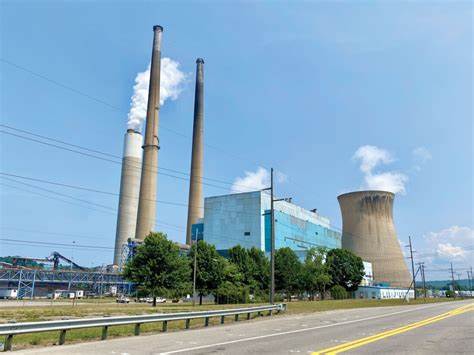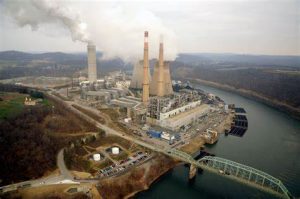
Pleasants Power Station is set to be closed down in less than 6 months. The economic effects have been thoroughly examined and discussed, quite eloquently by the letter from Craig Straight sent to the West Virginia Public Service Commission (click to read) on the behalf of all Pleasants employees. but what no one is talking about is the broader, and more important issue of national energy security involved in the removal of Pleasant’s 1,300 mega-watts from the grid.
 All of us in the electrical generation industry are well aware of the weather extremes we deal with to keep the power flowing. From oppressive heat waves to sub-zero polar vertexes, the dedicated men and women that operate and maintain coal fired power plants manage to keep the plants online.
All of us in the electrical generation industry are well aware of the weather extremes we deal with to keep the power flowing. From oppressive heat waves to sub-zero polar vertexes, the dedicated men and women that operate and maintain coal fired power plants manage to keep the plants online.
Make no mistake, the constant and consistent supply of electricity is a foundational issue for our state and country.
This electricity saves lives by powering homes, businesses, and infrastructure that makes our way of life possible. Without this vital lifeline, life is reduced to basic sustenance, and for some of our most vulnerable citizens life is not sustainable.
The power generation business is changing more that it has over the past century. New technologies, shifts in public perception of fossil fuels, and the deployment of renewables on a utility scale has added volitivity into an industry that, by it very nature, is structured to resist and repel such influences.
This is an issue that has been made political by forces at work who wish to transition the nation’s power supply to a carbon-free source. Unless you are actually in the power generation business, it’s difficult to fully impart to others that the technology needed to fulfill this goal is not evolved to the point that we can simply pull the plug on fossil fuels.
We have been promised an “all the above” energy policy from our political masters, yet they actively work against fossil generation and allow widespread, and in our opinion irresponsible, closing of plants that have served this country reliably for decades. They do this by subsidizing sources of power that are barely past the experimental stage, by passing onerous environmental standards, and denying fossil plants any help to upgrade and maintain their plants.
 Hatfields Ferry Power Station in Masontown, PA, is a prime example of this. After almost a billion dollars is environmental upgrades that included brand new scrubbers, this 1,700 mega-watt coal plant was unceremoniously shuttered in 2013 after over four decades of service.
Hatfields Ferry Power Station in Masontown, PA, is a prime example of this. After almost a billion dollars is environmental upgrades that included brand new scrubbers, this 1,700 mega-watt coal plant was unceremoniously shuttered in 2013 after over four decades of service.
The need for baseload power is well documented and fleshed out in many articles, such as the excellent article, How Important is Baseload Generation Capacity to U.S. Power Grids’ Reliability?, by John Miller, as it appears on Energy Centrals‘ website. One of our own members sounded the alarm in a 2013 article submitted to West Virginia’s own The State Journal that states plainly that, “Nothing Can Replace Coal For Baseload Power Needs.“
The Utility Workers Union of America, Local 304, stand in solidarity with our Brothers and Sisters of other trade unions such as the Boilermakers, Pipefitters, Ironworkers, the IBEW, and many others, in saving Pleasants Power Station. Lest you think otherwise, the Pleasants Power Station is not a union station, but it was built and requires the skills and professionalism of a vast amount of union workers to operate safely and reliably.
This is not a union/non-union, Republican/Democrat, conservative/liberal thing it’s just plain common horse sense. We are not insensitive to our Brothers and Sisters at the W.H. Sammis Plant that is also slated for closure.
There will be a day when the technology catches up with the desire to power our nation in a carbon-free environment, but that day is still awaiting for those sources to evolve to the point of being as reliable as what it replaces.
In the meantime, coal is being burned cleaner and more efficiently as ever before in history. Fossil fuels have set a high bar for anything offered as a viable alternative in terms of affordability and durability.
The bottom line is this; if a coal fire power plant with all the proven and scalable pollution controls installed can’t operate when sited in one of the most coal rich states in our country, then it’s just a matter of time before all these plants disappear.
NOTE: Your union does our best to research and draw information from proven and reliable sources. IF YOU ARE NOT CLICKING THE ABOVE HIGHLIGHTED LINKS YOU ARE NOT GETTING THE WHOLE STORY
